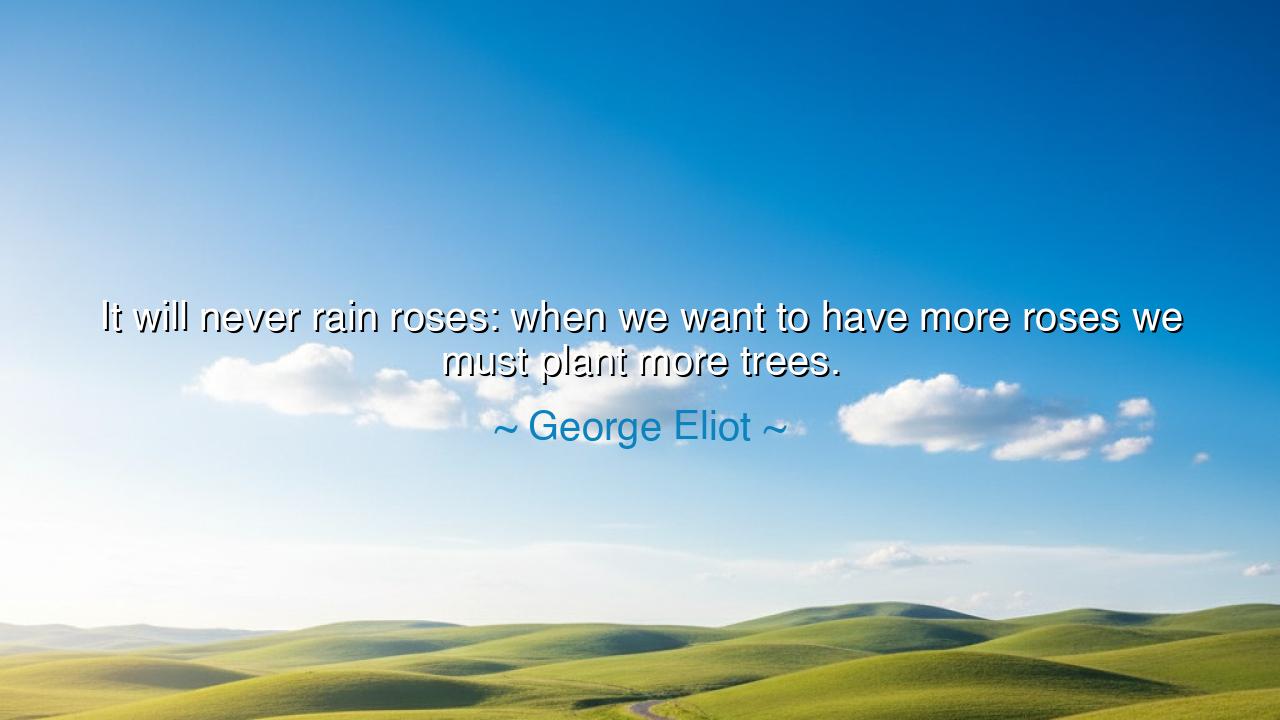
It will never rain roses: when we want to have more roses we must






O Seekers of Wisdom, gather close and listen well to the words of George Eliot, whose insight into life’s work and rewards rings through the ages. "It will never rain roses: when we want to have more roses we must plant more trees." In this statement, Eliot speaks to a profound truth about the nature of effort, desire, and patience. Roses do not simply fall from the sky, as if by some magical grace; they are the result of deliberate action, the careful tending of the soil, the planting of the seeds, and the nurturing of growth. Eliot reminds us that if we wish to see results—if we long for the rewards of beauty, success, or fulfillment—we must first put in the necessary work to cultivate them.
In the ancient world, this wisdom was known well. The Greeks understood that success was not born of fortune alone but was the result of effort and perseverance. The philosopher Aristotle taught that virtue and greatness come not from passive wishfulness, but from deliberate action and the cultivation of good habits. His concept of eudaimonia, or living a flourishing life, required not simply desiring good things, but actively working to create the conditions in which those things could grow. The roses, in this case, are the good things in life, and the trees are the steady, sometimes challenging, work needed to bring them into being. Eliot’s words reflect this ancient understanding: if you want beauty or success, you must first plant the seeds and tend to them with care and patience.
Consider, O Seeker, the example of Cincinnatus, the Roman farmer and general, who was called to serve his country in a time of great need. Upon completing his duties, he returned to his fields and his simple life. His success as a leader was not accidental but came from years of steady, diligent work—just as Eliot suggests, it was Cincinnatus' planting of virtues like humility, discipline, and resolve that bore fruit in his moment of need. The roses of his leadership did not appear by chance, but through the tree-planting efforts of consistent, honest work throughout his life. Cincinnatus teaches us that even the grandest rewards—whether personal virtue or public achievement—are the result of persistent effort, just as a rose garden is the result of tending the soil, watering the roots, and nurturing the growth.
In the Buddhist tradition, this wisdom is echoed through the concept of karma, the idea that our actions shape our future. Just as one cannot expect to reap the benefits of a garden without planting and caring for it, so too do we understand that our actions today create the conditions for our experiences tomorrow. Eliot’s words speak to this fundamental principle: to have roses—the good things in life—we must first plant the trees—the actions, intentions, and habits that will bring them forth. Life, like a garden, does not simply deliver its fruits without our effort; it requires that we tend to it, nurture it, and shape it with our own hands.
Let us also reflect on the story of Demeter, the Greek goddess of agriculture, whose relationship with the earth and the seasons embodies this principle. When her daughter Persephone was taken to the underworld, Demeter mourned, and the earth became barren. It was through her grief and eventual action—restoring balance to the earth—that the world once again flourished. Demeter’s story teaches us that even in the face of loss, we must plant again to restore and bring about the growth we desire. The act of planting the trees is often not just a physical act, but an emotional one, where we sow seeds of hope, effort, and determination to create the life we seek. Eliot’s reminder is that while we may desire roses, they require us to work the soil—sometimes through pain, sometimes through labor—but always through action.
The lesson of Eliot’s words is clear and essential: desire alone is never enough. If you wish to see change, whether in your career, your relationships, or your own growth, you must take action. Roses do not simply appear without effort, and neither do the fruits of a fulfilled life. The trees you plant today—whether they are acts of kindness, commitment, or patience—are the very foundations of the beauty and success you will enjoy in the future. Just as a gardener does not sit idly by, hoping for roses to grow, so too must you plant, tend, and nurture your goals with purpose and persistence.
In practical terms, O Seeker, reflect on your own life. What roses do you wish to see bloom? What trees must you plant today to bring about that future? Whether you are seeking a career, deeper relationships, or personal transformation, ask yourself: what actions must you take? What habits must you cultivate? Just as a gardener waters, prunes, and cares for the garden, so too must you nurture the efforts that will lead to the fruits you seek. Do not wait for the roses to fall from the sky; plant the trees, water them, and give them the care they need to grow.
So, remember this, O Seeker: life, like a garden, requires work and patience. Eliot reminds us that nothing of beauty or worth is given without effort. To have the roses, you must plant the trees. May you, in every area of your life, tend to what you wish to see flourish, and may you find joy in the act of planting, nurturing, and watching your dreams bloom into something magnificent.






AAdministratorAdministrator
Welcome, honored guests. Please leave a comment, we will respond soon